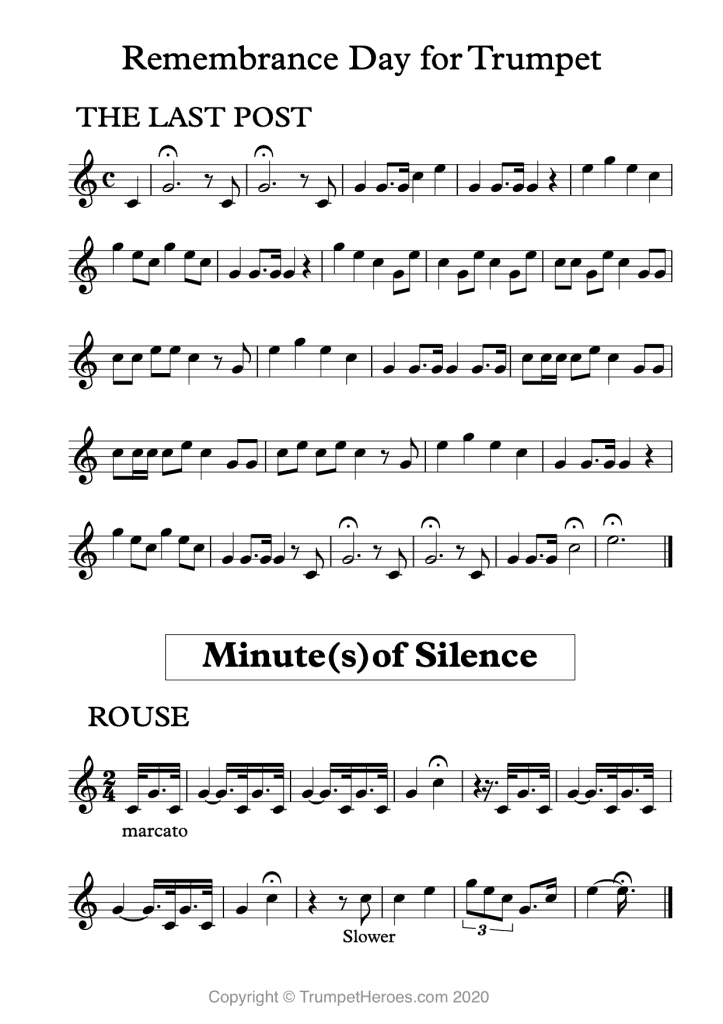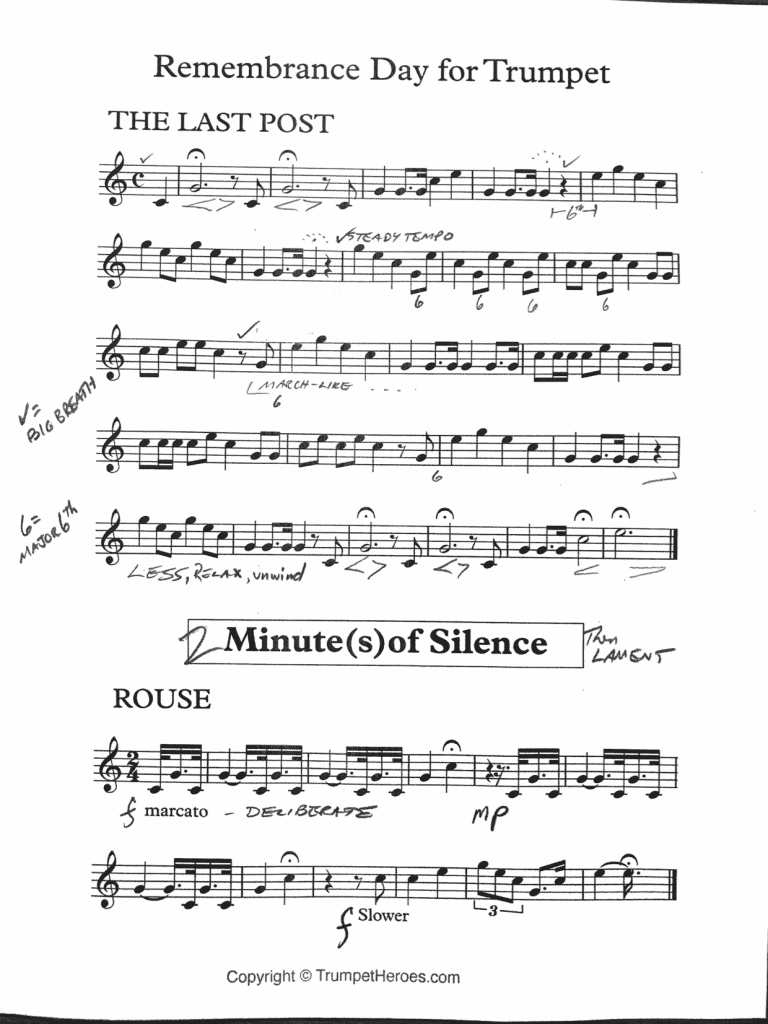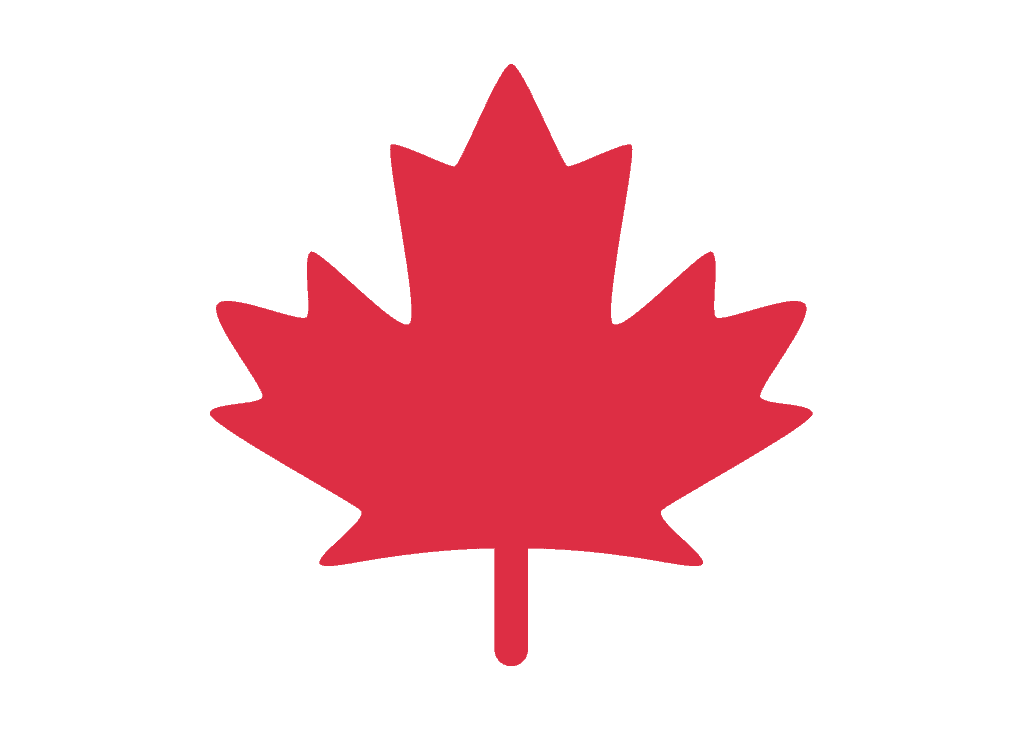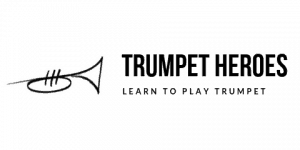Here is a free copy of the Last Post Trumpet sheet music and some tips for playing it at your school’s or community’s Remembrance Day ceremony on November 11.
Trumpet Sheet Music for The Last Post
Here’s a nice clean copy of the last post trumpet sheet music with just the notes. If you want some tips, thoughts or ideas continue down the page for an annotated version that’s pretty much what I use on Remembrance Day and at funerals for veterans.

Playing The Last Post on Trumpet
Assuming that this last post trumpet sheet music is to be used in a school setting, there are some thoughts I’d like to share on how to play it.
First of all, it’s not to be taken lightly. While it rarely gets performed flawlessly, it should always be approached with that goal in mind. It is used in ceremonies to honour people who died serving our country, so it’s difficult to imagine a more solemn occasion. The Trumpet player honours the fallen in advance by preparing as well as possible for that performance.
Attempting to perform this music from memory is not necessary. Yes, you will see and hear the best military players do exactly that on the TV broadcast. Those players have spent tens of thousands of hours practising Trumpet and some hundreds of those hours will have been on this specific music. Putting that pressure on a young player is asking for trouble. Use the sheet music – that’s why it’s here, and free.
The Royal Canadian Legion currently specifies that the silence be two minutes long. For older students and the general public that’s the standard. Your school principal might ask for a somewhat shorter silence. While that silence can be uncomfortable, it should be the most important part of the ceremony.
“The last note of Last Post marks the beginning of the 2 minutes of silence. During the silence, do not play any musical instrument, including bagpipes. This would detract from quiet reflection on the service and sacrifice of the dead. Following the 2-minute period of silence, play Rouse. Then lay the official wreaths.”
Music for commemorative ceremonies: How to properly use these musical pieces, Canadian Armed Forces, Government of Canada
Recordings of the Last Post & Rouse on Trumpet
The Legion also has good recordings of The Last Post, Rouse, O Canada and God Save the Queen on its website. It also has a recording of the Lament – that is sometimes played on Bagpipes after the silence just before the Rouse. The Legion invites people to download and use these recordings for ceremonial purposes.
I’m old. I’ve heard hundreds of players perform this music on hundreds of occasions but I’m not sure I’ve ever heard it played the same way twice. If you’re trying to figure out when to go fast, when to slow down, which notes to hold and how long or loud don’t try to copy any one recording. Play the piece(es) a bunch of times, think about it, listen to some more recordings and figure out what you like and don’t like. Then it’s a simple matter of making what you’re doing similar to what you like. On the last post sheet music shown below are some markings that a trumpet student and I pencilled onto her copy so that she’d remember what she liked and had decided to do with it.
Playing Tips for The Last Post on Trumpet
The thing that gets the most players in trouble with The Last Post is really the same thing that’s responsible for the most wrong notes in any Trumpet section in any band – mispitching. It’s the issue of hitting the wrong note and its ugly twin … hitting a note for just a millisecond then splitting off that one to another note nearby. Because this piece is a Bugle call the notes are relatively far apart but it’s still easy to get off track after one simple mispitched note.
The interval (distance) between the printed G in the staff and the E above it accounts for the most mistakes. Practise that interval. Sing it. Make sure that you hear it before you have to play it – another good reason to have the notes in front of you. If that interval gives you grief, mark on the music at each place it occurs and prepare to play it well. If you overshoot it or undershoot it you’ll know, because you prepared so well. You can just carry on from there on the right notes. That interval is called a Major Sixth – like the first 2 notes of “My Bonnie Lies Over The Ocean …” and quite possibly some other song, maybe even one from this century.
In the copy below we put a “6” under all of those Major 6ths just to be safe.

More Thoughts:
The fact that you’re playing all alone might seem scary at first but it does mean that you can take extra time where you need it – like for a breath. You can rush or slow down if you think you should. You can take an extra moment before you start to make sure you’re completely ready. Those are good things.
If you’re playing outdoors or in a really large arena try to practise at least one time in that environment. You won’t sound the same as you do in the band room or your bedroom, mostly because you can’t hear your sound bouncing off the walls. This is something to get used to if you can.
What if those G’s at the top of the staff are keeping you from playing this music well? If you find that every time you practise the thing you are missing the high G’s a lot, then the piece is just too high for your current comfortable working range on the Trumpet. If you’re still the one who’s got to play it – perhaps you’re not really experienced but you’re the best player in your school that’s willing to try – there is one more trick you can use. You’ve been playing on a Bb Trumpet on all open notes. If you play the entire piece with your second valve down it’ll all sound the same, just a semitone lower. If the high note is still not quite there, try the whole thing with the first valve down. That makes the high note an F instead of a G. You just keep that valve down for the whole piece. It will sound a little lower but if you play it well instead of missing a lot of G’s the result will be way better. You can even go lower but eventually it will start sounding odd. I wouldn’t go past 1st and 2nd valves down. It’s as though you’re playing a Bugle that’s longer than a Bb Bugle.
Someone might ask you to play Reveille (pronounced Revely) where Rouse is. If you’re playing in Canada what they really mean is Rouse, so just play that and let them call it what they want. I called it Reveille for a few decades before a Canadian Navy Vet who had sailed with my Dad pointed out the real name in English. (He was playing the Lament on the pipes.) In an officially bilingual country it’s easy to get things confused: the French Title for Rouse is Réveil. We were both (almost) right. Anyway, the notes are the same in any language.
In the first paragraph of this post I said something about how a Remembrance Day ceremony is a solemn occasion. It is. You have a very specific and important role to play, and in spite of any feelings you may have about pretty much anything (sad feelings about a family member, thoughts about war, something that a speaker said at the ceremony, something that someone at school said or did) you have just one job to do. Make that job the only thing your mind is capable of in that moment. Focus on the solitary goal of task completion. If Remembrance Day events make your emotions flow that’s a good thing. Let them flow before the event and/or after the event. During the event you need to be all business.
One last thing, and this might be a case of the last thing being the most important thing. Relatively few people can say that they played The Last Post in public. I know the odd person who will say that they play it pretty well but no Trumpet player says they always play it perfectly – neither will you. You want to be able to say that you played it well, and that’s a relative term. Prepare as well as you can and go into the occasion ready; having thought about playing it well, having practised playing it well, be warmed up and not worn out. Do your best and accept the result. If it wasn’t perfect, get in line with the rest of us and hold your head high. You are a Trumpet Hero.

